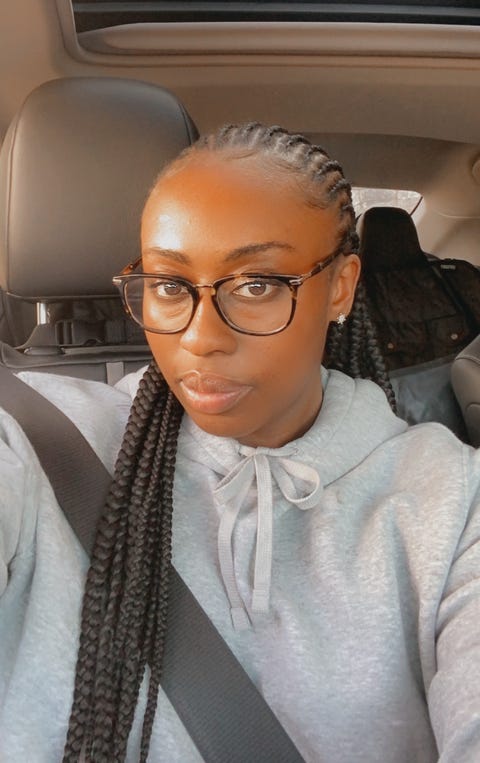The Black hair salon has always been a familiar place to me. After struggling to do my hair herself due to my tender-headedness, my mother took me to the beauty salon.
I spent my first time at the salon in tears, screaming in agony as I got my hair braided. Hours later, I begged my Mom not to go back, but still, she took me every other Saturday. I would think of it as a “Mommy and Me” day—my brothers typically stayed home, and these outings were the few days a month I had my Mother all to myself—but I still didn't realize yet the vast impact that going to a Black salon would have on my life.
We would spend roughly six to eight hours getting our hair shampooed and styled. My mother would get her usual short haircut with finger waves or spiked curls. I would get a press and curl until I was older and discovered a leave-out sew-in. Days at the salon were full of listening to “grown folk business,” watching countless Tyler Perry plays, and flipping through endless issues of Jet.
The salon was always filled with laughter, but sometimes people needed to cry it out, too—which always led to an outpouring of love. Throughout my 10 years going to that salon, I learned about forgiveness as I watched two older women reconcile and cry in each other's arms. I learned about giving back as I watched a first lady of nearby church purchase food for a homeless man, who stayed near the salon, after getting her hair done.
Living in a rural area in Kentucky, the Black salon was the only place where I would see successful women, outside of my Mother, who looked like me.
Living in a rural area in Kentucky, the Black salon was the only place where I would see successful women, outside of my Mother, who looked like me. I saw women soldiers, entrepreneurs, and professionals wearing suits with heels. Watching them inspired me to dream big about becoming a powerful woman, a woman who wears her confidence openly, is courageous and selfless, and able to withstand any obstacle.
The hair salon taught me about beauty and fashion as well. I learned about skincare products as a Mary Kay representative sold me my first facial cleanser. I learned makeup tips and tricks as I watched a makeup artist perfect clients’ faces. I learned about fashion as I watched clients come and go with Michael Kors and Coach bags, which would of course turn into me begging my Mom for the same one later. The beauty salon became more than a place to get my hair done; it became my teacher.

In 2016, I packed my bags and went off to college. While in school, I stopped going to the beauty salon as much. I quickly learned that getting your hair done is a luxury; as a college student without a job, going to the salon every two weeks wasn't something I could afford. I started embracing my natural hair. After endless failed attempts of twist-outs that resulted in a high puffs, not getting my hair done professionally took a toll on me. I went into a hair depression.
So I started getting protective styles from a local braider, usually at their house. But even though my hair was styled and I felt more confident, I still missed the culture that the my home beauty salon provided.
After graduating, I moved back home with my parents. I was due for a new hairstyle, so I scheduled an appointment with a beautician in my hometown. On the day of the appointment, I walked into a beauty shop that I have never been to before. The first thing I noticed was the beautician stations along the walls, nostalgic art paintings of Black salons, and older issues of Essence magazines on the coffee table.
As I sat there quietly, waiting to get my hair done, I watched another beautician straighten a young girl's hair. “Ouch,” she said as the heat from the flat iron burned her scalp. A flood of memories came rushing back. A few moments later, my beautician waved for me to sit in the chair. She draped a hair cape over me and began detangling my hair.
As I sat there deep in conversation, I felt the same way I had getting my hair done as a young girl.
Netflix's I Care was playing on the huge flat screen in front of the shop, which later sparked a conversation. I was still kind of quiet until I saw a familiar face—a long-time family friend who owned a barbershop in the back of the salon. I was filled with excitement to see someone I knew. We talked about how much I had grown up and old memories of my family. With the whole salon hearing our conversation, people began to chime in, saying, “Oh, that's your brother, I know them. I remember you when you were a baby.” In that instant, I felt at home. My shyness went away, and I began opening up more with the women in the salon. As I sat there deep in conversation, I felt the same way I had getting my hair done as a young girl. I felt at home.
The salon always been sanctuary for Black women. A place where you are allowed to be vulnerable and share your frustration about your relationship, career, and the community. A place to take off your mask and relax without the fear of being judged. The Black salon is more than a salon; it is a place where you come in feeling weary and leave ready to tackle all the challenges the world is trying to throw at you. The community around the salon watched me grow up, made me feel protected and safe, and helped me become the woman I am today. The Black hair salon is my home.
